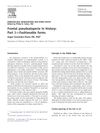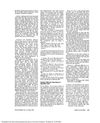 17 citations,
November 2013 in “American Journal of Primatology”
17 citations,
November 2013 in “American Journal of Primatology” Different monkey species in a lab showed varying levels of hair loss due to factors like type, sex, age, season, and living conditions.
 14 citations,
June 2022 in “BMC genomics”
14 citations,
June 2022 in “BMC genomics” Key genes crucial for sheep hair follicle development were identified, aiding fine wool breeding and human hair loss research.
 14 citations,
August 2012 in “Clinics in Dermatology”
14 citations,
August 2012 in “Clinics in Dermatology” In the Middle Ages, European noblewomen intentionally removed forehead hair to be fashionable, showing how beauty standards can affect the perception of hair loss.
12 citations,
December 2020 in “Comprehensive psychoneuroendocrinology” Hormone levels in hair change during pregnancy, with progesterone increasing significantly compared to non-pregnant women.
 12 citations,
May 2005 in “Current obstetrics and gynaecology/Current obstetrics & gynaecology”
12 citations,
May 2005 in “Current obstetrics and gynaecology/Current obstetrics & gynaecology” Hirsutism is too much hair growth in women like the pattern in men, often caused by high male hormones, and can be treated with hormone control and hair removal methods.
 11 citations,
May 1976 in “Archives of Dermatology”
11 citations,
May 1976 in “Archives of Dermatology” Starving yourself can cause hair loss, but stopping the diet can improve it.
10 citations,
November 2008 in “Veterinary Dermatology” The mouse hairy ears mutation causes longer ear hair due to changes in gene expression.
7 citations,
April 2022 in “Journal of pharmaceutical and biomedical analysis” The method can measure multiple steroids in human hair to study long-term steroid metabolism, especially in newborns and children.
 6 citations,
February 1974 in “The BMJ”
6 citations,
February 1974 in “The BMJ” The document concludes that scalp disorders can be treated with hair washing, specific shampoos, medications, and sometimes surgery or hair transplants, but hereditary baldness is untreatable.
 3 citations,
March 2022 in “Haya: the Saudi journal of life sciences”
3 citations,
March 2022 in “Haya: the Saudi journal of life sciences” Dates may improve heart health, fight infections, protect kidneys, reduce inflammation, support pregnancy, promote dental and bone health, enhance mental function, and have anti-cancer properties, and are also beneficial for skin and hair care.
 3 citations,
January 1996 in “Pharmacotherapy: The Journal of Human Pharmacology and Drug Therapy”
3 citations,
January 1996 in “Pharmacotherapy: The Journal of Human Pharmacology and Drug Therapy” Zidovudine may cause hair loss in advanced-stage HIV patients.
 2 citations,
May 2021 in “Scientific Reports”
2 citations,
May 2021 in “Scientific Reports” Stress is likely causing hair loss in Formosan macaques.
 1 citations,
July 2022 in “Functional foods in health and disease/Journal of functional foods in health & disease”
1 citations,
July 2022 in “Functional foods in health and disease/Journal of functional foods in health & disease” Taking a probiotic supplement twice a day improved hair growth, skin hydration, and metabolic health in adults at risk of metabolic syndrome.
 1 citations,
January 2017 in “Evolutionary studies”
1 citations,
January 2017 in “Evolutionary studies” Different human traits like skin color and hair type vary between populations due to genetic adaptations to the environment.
 1 citations,
February 1994 in “Drug Investigation”
1 citations,
February 1994 in “Drug Investigation” Sulfasalazine might cause hair loss, especially in women, and stopping it can reverse the hair loss.
 May 2024 in “Journal of trace elements in medicine and biology”
May 2024 in “Journal of trace elements in medicine and biology” Overweight or obese women before pregnancy have lower iron levels in their serum and hair during early pregnancy.
 November 2020 in “Elsevier eBooks”
November 2020 in “Elsevier eBooks” Antiandrogens and androgen inhibitors like spironolactone, finasteride, and dutasteride can treat hair loss and skin conditions, but they have risks and side effects, including potential harm to pregnant women and risks of cancer and heart issues. Herbal remedies also have antiandrogenic effects but lack safety validation.
 September 2020 in “Annals of the National Academy of Medical Sciences. India”
September 2020 in “Annals of the National Academy of Medical Sciences. India” COVID-19 can cause skin issues like "COVID toes," rashes, hair loss, and hand eczema, and dermatologists are important for recognizing these signs.
 August 2016 in “Journal of Dermatology”
August 2016 in “Journal of Dermatology” A chemical called 5-Bromo-2′-deoxyuridine caused rapid hair loss in mice by killing certain skin cells through a specific cell death pathway.
 January 2003 in “Elsevier eBooks”
January 2003 in “Elsevier eBooks” Androgens and other hormones affect hair growth and skin conditions like acne.
 July 1975 in “Archives of Dermatology”
July 1975 in “Archives of Dermatology” The document suggests a possible connection between rapid weight loss and hair loss, and reports a case of skin condition improvement after stopping acne medication.
 149 citations,
June 2002 in “British Journal of Dermatology”
149 citations,
June 2002 in “British Journal of Dermatology” Minoxidil works better for female hair loss, but cyproterone reduces scalp oiliness and causes menstrual issues.
 6 citations,
April 2017 in “Frontiers in Pharmacology”
6 citations,
April 2017 in “Frontiers in Pharmacology” Chinese medicine may help treat hair loss by affecting genes and enzyme activity.
 67 citations,
July 2006 in “Clinics in Dermatology”
67 citations,
July 2006 in “Clinics in Dermatology” Androgens cause skin issues like acne and hair growth in women, often due to PCOS, and can be treated with medication and lifestyle changes.
 December 2013 in “Iranian Journal of Applied Animal Science”
December 2013 in “Iranian Journal of Applied Animal Science” Adding bentonite clays to goat diets increased milk yield, periwinkle shell improved chicken egg production, and vaccination increased muscle area and carcass yield in calves.
 1 citations,
May 1976 in “Archives of Dermatology”
1 citations,
May 1976 in “Archives of Dermatology” Extreme weight loss from crash dieting can cause significant hair loss.
 4 citations,
December 2014 in “European Journal of Chemistry”
4 citations,
December 2014 in “European Journal of Chemistry” Iron chloride helps create compounds that could be useful in medicine, like treating hair loss.
 42 citations,
July 2015 in “Journal of The American Academy of Dermatology”
42 citations,
July 2015 in “Journal of The American Academy of Dermatology” The conclusion is that oral contraceptives and antiandrogens can treat hirsutism and acne in women with cutaneous hyperandrogenism, but more research is needed for effective treatments, especially for hair loss.
 2 citations,
March 2015 in “World journal of acupuncture-moxibustion”
2 citations,
March 2015 in “World journal of acupuncture-moxibustion” Traditional Chinese medicine techniques like catgut embedment, moxibustion, and bloodletting showed better results for treating hair loss than the drug finasteride.
 128 citations,
September 2011 in “British Journal of Dermatology”
128 citations,
September 2011 in “British Journal of Dermatology” Obesity is linked to various skin problems and may increase the risk of skin cancer.



























